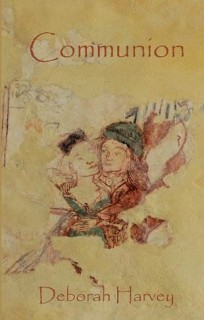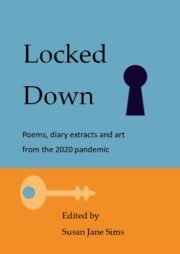
Poet and Poetry Space Editor, Susan Jane Sims reviews Communion, A first collection by West Country Poet, Deborah Harvey.
In a recent episode of Dr Who on BBC TV, Sir Winston Churchill exclaims to the Doctor that “all of history is happening at once.” This is how I felt on reading Deborah Harvey’s first collection,Communion. Deborah’s knowledge of history and myth particularly in relation to her West Country heritage is impressive. The collection is wordy yet no word is superfluous within the context of these poems. Each one is a mini-masterpiece, each finding its own natural form and rhythm.That said I won’t attempt to compete by discussing too many of the poems and will concentrate on two that I am particularly drawn to as they explore the political through a personal context. The opening poem, Tobruck, for example takes as its subject a World War Two veteran from a fierce desert campaign and uses this to expose the gaping wounds concealed within silence. It begins with the two minute silence of Armistice Day, something most of us feel compelled to take part in publicly or privately as a mark of respect and ritual, and explores how it masks the true story of lives irreparably changed by the trauma of war. The silence prevents one human being from really knowing another, even a daughter and a father, yet it feels like the only option to a truth so unpalatable, so impossible to imagine for those not there that it simply can’t be talked about, until a ceremony and ironically a silence brings together people with a shared history, and in its aftermath stories are exchanged as reminiscence.
Silence also implies a glossing over, shiny medals given to buy silence; the true horrors concealed so that others will continue to make the personal sacrifice that battle demands in the name of patriotism. In the scene described, the narrator of the poem, comes as close as she has ever, or maybe will ever come to witnessing what her father has experienced in the desert, as she catches snatches of his conversation with old comrades described as “those soldiers in slippers/with cemetery teeth” and she herself tries to visualise events and panics. There is both the fear of him surviving to tell her more and the fear of him not living long enough to do so. More than that there is also the fear that if he talks, will their relationship alter? Will he still be the father she knows and loves? Will her image of him remain the same? Or will a “terrible beauty be born” as Yeats described in a poem about the human toll of the Irish conflict.
The ties that bind us and weigh us down is further explored in the poem Motherlode, a fascinating many layered poem. Just the title intrigues with its multiple meanings. A lode is a plentiful supply of something, a deposit or vein of ore deep in the earth and it’s also a waterway. Using the word “lode” with “mother” to create “motherlode” implies both the idea of giving and nurturing alongside the idea of something essential being taken. A mother gives and she is also mined in the sense that much is taken from her. Spelt as “load”, the word implies a burden carried. The mother within this poem or more precisely her body is described in the opening lines:
her body a body of water,
running slack after the storm and oceanic
This is a woman altered by giving birth and/or the demands of motherhood, yet vast, abundant, her surface “mapped and moulded”. Her body has been explored and shaped by lovers, children and teams of medical professionals, her body entered, fed from and known intimately as only a woman’s body can be. In doing this the woman has reduced her own life:
in this small life she has surrendered
made smaller
Life, small anyway in the context of the universe, has been made smaller by becoming a mother. Yet this is not a negative poem. It ends with the acknowledgement that as well as being load bearing days, a woman’s child-bearing years are crucially “sacred days/with their tidal rhythms”. The allusion is both to the precious days after giving birth when bonding between mother and child takes place, and also the fertile years of a woman’s life when she is inevitably tied to and part of the rhythms of the natural world.
This is a well researched and perceptive first collection from an inspiring poet. I am looking forward to future collections and to Deborah’s novel which I know is to be released soon.
Susan Jane Sims
Editor, Poetry Space Ltd
Communion. Indigo Dreams Publishing, October 2011
ISBN 978-1-907401-51-0
Deborah’s poems The Mary Block and Public Transport were highly commended in Poetry Space Competition 2010 and previously published in Collage: the best of Poetry Space 2010.
Deborah’s poems The Mary Block and Public Transport were highly commended in Poetry Space Competition 2010 and previously published in Collage: the best of Poetry Space 2010.







